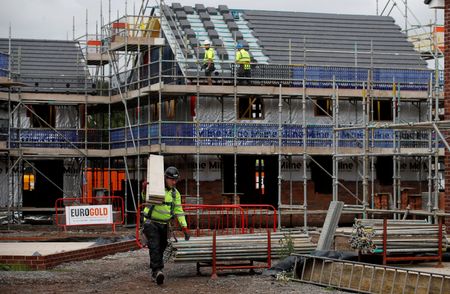By Aby Jose Koilparambil
(Reuters) – British housebuilders may cut dividends to preserve cash and ride out a property downturn, as high mortgage rates make homes less affordable and economic uncertainty deters buyers.
The move by Persimmon in November – to scrap its dividend policy and rule out a special dividend – has started what analysts say could become a trend in a sector that has seen share prices tumble last year, partly because of a slowdown and regulatory hurdles.
The slowdown follows more than two years of strong growth for housebuilders, fuelled by cheap mortgages, rising demand for bigger homes as more people turn to remote working and state support measures, including a tax holiday on property purchases.
“There is an increasing risk that dividends are cut further as we potentially see further earnings downgrades come through on a weakening housing market,” said Aynsley Lammin, equity research analyst at Investec.
AJ Bell investment director Russ Mould said dividend cuts could give builders more flexibility and the chance to buy land more cheaply, should such a situation present itself, unlike in 2008 when they slashed dividend payouts due to debt and financial pressure.
Investors will be paying particular attention to dividend policies as major UK housebuilders issue trading updates this week, starting with top player Barratt on Wednesday.
Home sales have already taken a hit because of surging mortgage rates, which climbed amid rocketing inflation even before the government’s mini-budget in September caused turmoil in the bond markets and drove borrowing costs higher still.
British house prices slid last month by the most since the 2008 global financial crisis, while the number of mortgages approved by UK lenders in November fell to its lowest since mid-2020.
Mortgage lender Halifax has forecast British house prices to fall in 2023 by around 8% and a housing downturn would mean preservation of cash would be key for builders.
The big, listed UK housebuilders have paid dividends worth 2.2 billion pounds ($2.6 billion) for their respective last financial years.
Potential cuts in dividends would weigh down on shares of housebuilders, after the sector index slumped more than 44% in 2022.
WHO MIGHT BE NEXT?
Among the FTSE 100 builders, analysts are now forecasting dividend cuts from many firms, particularly those whose payouts are linked to earnings growth.
“With the exception of Taylor Wimpey and Berkeley Group, which have dividend policies not based on earnings cover targets, the whole sector is vulnerable to dividend cuts if earnings fall as expected in 2023,” said Lammin.
High-end housebuilder Berkeley stuck to its cash-return plans, but cut its earnings estimates for the 2024 and 2025 fiscal years.
Barratt, Persimmon and Berkeley have said they would be more cautious with land purchases, in a bid to reduce outgoings as falling property prices squeeze margins.
Existing bookings for new homes may ease some of the immediate pressure to cut payouts, although analysts said that could change if cancellations rise and the slowdown gains pace.
“We expect housebuilders to run down their order books, so volumes should hold up okay in the year up to December 2023, and after that volumes will be more impacted by slower sales rates,” said Charlie Campbell, investment analyst at Liberum Capital.
To attract more buyers, housebuilders may have to offer more incentives, such as providing assistance with mortgage payments and covering expenses for customers making a move.
Prospects for government support were dealt a blow in the latest budget, when Finance Minister Jeremy Hunt reversed plans for a permanent tax exemption, saying it would only run until March 2025.
AJ Bell analysts note that big, listed builders have dished out 11 billion pounds to shareholders in dividends and a further 1 billion pounds in share buybacks since the launch in 2013 of Help to Buy – the government scheme to help first-time buyers get a property with just a 5% deposit – which ends in March.
The government last month said it would extend a programme that encourages lenders to offer 95% loan-to-value mortgages to first-time buyers.
($1 = 0.8435 pounds)
(Reporting by Aby Jose Koilparambil in Bengaluru; Editing by Edmund Blair, Josephine Mason and David Evans)

